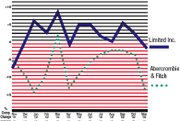Retail Sales: Specialty Stores
The year 2002 was among the better ones for Columbus, Ohio–based Limited Brands Inc. since it began its restructuring process in 1995, which includes closing more than 1,000 underperforming stores and streamlining its business. Chief among its changes this year was the re-acquisition of Intimate Brands stock (bringing into its fold white-hot Victoria’s Secret), the sale of its Lerner New York unit and a new moniker for the company (formerly known as the Limited) as it focused on promoting its entire portfolio of brands, including Limited Stores, Express and Henri Bendel. Renaming the 4,062-store chain was a strategy that followed initiatives begun last year: selling Lane Bryant to Charming Shoppes Inc. and folding Structure, the company’s beleaguered men’s business, into the Express brand. Limited is also changing the face of retail marketing with the continued success of its televised $7 million “Victoria’s Secret Fashion Show.” There was a struggle in the fourth quarter of 2002 with same-store sales increases below expectations. But the better performance of the $8.8 billion specialty retailer was a sharp contrast to a number of peers that languished in 2002, including Limited’s former unit, Abercrombie & Fitch. The $1.36 billion retailer of pricey college-age clothing in November 2002 posted its eighth straight month of same-store sales declines. Analysts say the figures result from the company’s focus on staying a full-price, non-promotional brand, which can hurt in the short-term but may yield better long-term results. The risk remains, however, that other competitively priced retailers will steal Abercrombie’s business. One growth prospect for the 583-store chain is the success of its lower-priced surfer-themed Hollister Co. stores, named for a hot surfing spot in Santa Barbara, Calif. Since its launch two years ago, Hollister has opened 71 stores in 33 states that target teenagers, and plans call for the unit to reach 600 to 800 stores, possibly overshadowing the Abercrombie chain itself. Analysts report the new brand could account for 25 percent of Abercrombie’s total profit. It’s a move that infuriates Southern California surf companies who see the upstart as a poseur in an industry they have long dominated. Controversy, however, is nothing new to the New Albany, Ohio–based retailer, who has marketed thong underwear to preteens and sold T-shirts bearing pictures offensive to Asian Americans. —Nola Sarkisian-Miller






















